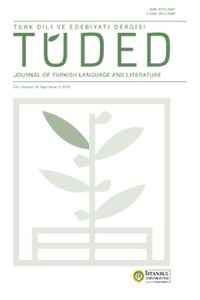Research Article
Year 2018,
Volume: 58 Issue: 2, 309 - 322, 26.12.2018
Abstract
Yazı hayatına şiirle adım atan fakat Türk Edebiyatında hikâyeleriyle tanınan Feyyaz Kayacan, Fransızca, İngilizce ve Türkçe eserler veren üç dilli bir yazardır. Hayatının büyük bir kısmını Londra’da geçirmiştir. 1940’larda İngiliz gerçeküstücülere katılmıştır. İngiltere’de Fransızca eserler yayımlayan bir Türk olmasının yazarlığının gelişmesine katkı sağlamadığını tam aksine kendini yitirmesine sebep olduğunu fark ederek Türkçe yazmaya başlamıştır. Ben anlatıcı kullanarak yazdığı otobiyografik hikâyelerinde sancılı geçen çocukluk yıllarını hatırlayarak geçmişini yeniden yorumlamayı ve kendini yeniden yaratmayı amaçlamaktadır. Bir olay anlatmaktan ziyade genellikle ben anlatıcının hatıralarına ve iç dünyasına yer verilen bu hikâyeler gerçeküstücü, varoluşçu, avangardist ve absürt öğeleri barındırmaktadır. Simgesel anlatımlarla, canlı imgelerle ve özgün metaforlarla bezeli hikâyeleriyle Türk edebiyatına öncülük eden Feyyaz Kayacan, İkinci Yeni şairleri ve 1950 Kuşağı hikâyecilerini etkilemiştir. Ayrıca postmodernizm anlayışı ilk olarak Feyyaz Kayacan’ın eserlerinde kendini göstermiştir. Feyyaz Kayacan’ın hikâyelerinin temelinde çocukluğu ve annesinin ruhunda açtığı yaralar vardır. Anne travmasını hayatı boyunca hisseden Kayacan’ın hikâyelerinde anne imgesi önemli bir yer teşkil etmektedir. Bu çalışmada Carl Gustav Jung’un Anne Arketipi ışığında Feyyaz Kayacan’ın hikâyelerinde anne imgesinin nasıl yer aldığı incelenmiştir. Annenin, çocukluğunda ve yetişkinliğindeki etkilerinin hikâyelere nasıl yansıdığı iki başlık altında ele alınmıştır.
References
- Ay, B. (1986). Feyyaz Kayacan ile yazın ve yazarlık üstüne. Hürriyet Gösteri, 69, 14-15.
- Ayral, C. (1980). Feyyaz Kayacan’la söyleşi. Oluşum, 28, 19-21.
- Batur, E. (1995). E/Babil yazıları. İstanbul: Yapı Kredi Yayınları.
- Bezirci, A. (1987). İkinci Yeni olayı. İstanbul: Gözlem Yayıncılık.
- Ebuzziya, T. (1973). Yeni Osmanlılar tarihi. İstanbul: Hürriyet Yayınları.
- Gürpınar, M. (2003, 5 Nisan). Feyyaz Kayacan. Cumhuriyet, s.15.
- Gürpınar, M. (1993). Feyyaz Kayacan için. Hürriyet Gösteri, 150, 82-84.
- İnal, İ. M. K. (1969). Son asır Türk şairleri. İstanbul: Milli Eğitim Basımevi.
- Jung, C. G. (2006). Analitik psikoloji. İstanbul: Payel Yayınevi.
- Jung, C. G. (2005). Dört arketip. İstanbul: Metis Yayınları.
- Jung, C. G. (2009). İnsan ve sembolleri. İstanbul: Okuyanus Yayınları.
- Kayacan, F. (2008). Bütün öyküleri. İstanbul: Yapı Kredi Yayınları.
- Kayacan, F. (1982). Çocuktaki bahçe. İstanbul: Tomurcuk Matbaası.
- Kayacan, F. (1963). Hayatım. Türk Dili, 147, 192–194.
- Kayacan, F. (1967). Soruşturma. Yeni Ufuklar, 176, 51-53.
- Miskioğlu, A. (1990a). Feyyaz Kayacan. Türk Dili, 21, 1–2.
- Miskioğlu, A. (1990b). Londra’da bir Feyyaz Kayacan. Türk Dili, 20, 1–2.
- Özlü, D. (1997). Borges’in kaplanları. İstanbul: Yapı Kredi Yayınları.
- Sarısayın, A. (2009). Erdal Öz: Unutulmaz bir atlı. İstanbul: Can Yayınları.
- Tosun, N. (2008). Erken bir postmodern: Feyyaz Kayacan öykücülüğü. Kitap-lık, 119, 105–109.
- Turan, G. (1998). Üç dilde yazar Feyyaz. Kitap-lık, 98, 96–97.
Year 2018,
Volume: 58 Issue: 2, 309 - 322, 26.12.2018
Abstract
Feyyaz Kayacan’s literary life began with poetry, but he was known for his stories in Turkish literature. He was a trilingual writer who composed books in French, English, and Turkish. He published in England and joined the British surrealist group in the 1940s. But when he discerned that being a Turk who published French poetry books in England did not contribute to his development as an author, he started to write in Turkish. In his autobiographical stories, he aimed to reinterpret his past and re-create himself by examining his painful childhood years. These stories include first-person memories and glimpses of his inner world, embellished with surrealist, existential, avant-garde, and absurd elements. Kayacan, a pioneer in Turkish literature for his stories full of symbolic narrations, vivid images, and original metaphors, influenced the “Second New” and “1950 Generation” movements. Besides postmodernism first appeared in his works. Kayacan’s stories focus on emotional wounds made by his mother. The image of mother is important in the stories of Kayacan, who felt this trauma throughout his life. In light of Carl Gustav Jung's Mother Archetype, we examine how the mother image takes shape in Kayacan’s stories.
References
- Ay, B. (1986). Feyyaz Kayacan ile yazın ve yazarlık üstüne. Hürriyet Gösteri, 69, 14-15.
- Ayral, C. (1980). Feyyaz Kayacan’la söyleşi. Oluşum, 28, 19-21.
- Batur, E. (1995). E/Babil yazıları. İstanbul: Yapı Kredi Yayınları.
- Bezirci, A. (1987). İkinci Yeni olayı. İstanbul: Gözlem Yayıncılık.
- Ebuzziya, T. (1973). Yeni Osmanlılar tarihi. İstanbul: Hürriyet Yayınları.
- Gürpınar, M. (2003, 5 Nisan). Feyyaz Kayacan. Cumhuriyet, s.15.
- Gürpınar, M. (1993). Feyyaz Kayacan için. Hürriyet Gösteri, 150, 82-84.
- İnal, İ. M. K. (1969). Son asır Türk şairleri. İstanbul: Milli Eğitim Basımevi.
- Jung, C. G. (2006). Analitik psikoloji. İstanbul: Payel Yayınevi.
- Jung, C. G. (2005). Dört arketip. İstanbul: Metis Yayınları.
- Jung, C. G. (2009). İnsan ve sembolleri. İstanbul: Okuyanus Yayınları.
- Kayacan, F. (2008). Bütün öyküleri. İstanbul: Yapı Kredi Yayınları.
- Kayacan, F. (1982). Çocuktaki bahçe. İstanbul: Tomurcuk Matbaası.
- Kayacan, F. (1963). Hayatım. Türk Dili, 147, 192–194.
- Kayacan, F. (1967). Soruşturma. Yeni Ufuklar, 176, 51-53.
- Miskioğlu, A. (1990a). Feyyaz Kayacan. Türk Dili, 21, 1–2.
- Miskioğlu, A. (1990b). Londra’da bir Feyyaz Kayacan. Türk Dili, 20, 1–2.
- Özlü, D. (1997). Borges’in kaplanları. İstanbul: Yapı Kredi Yayınları.
- Sarısayın, A. (2009). Erdal Öz: Unutulmaz bir atlı. İstanbul: Can Yayınları.
- Tosun, N. (2008). Erken bir postmodern: Feyyaz Kayacan öykücülüğü. Kitap-lık, 119, 105–109.
- Turan, G. (1998). Üç dilde yazar Feyyaz. Kitap-lık, 98, 96–97.
There are 21 citations in total.
Details
| Primary Language | Turkish |
|---|---|
| Journal Section | Research Articles |
| Authors | |
| Publication Date | December 26, 2018 |
| Submission Date | September 28, 2018 |
| Published in Issue | Year 2018 Volume: 58 Issue: 2 |


